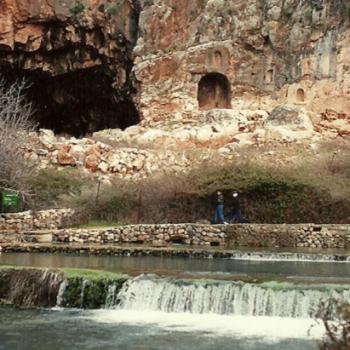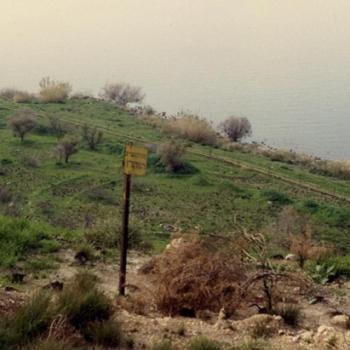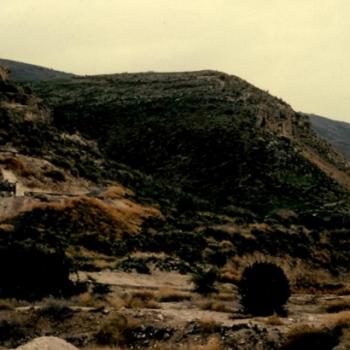Jesus’ ascension into heaven is a classic text for when we have to say goodbye to somebody we hold dear. What a way for Jesus to say goodbye: to rise straight up into the clouds! No hugs. No choked-up speeches of regret. Before they know it, before they can get one more word in edgewise, before they can grab him and keep him from flying away, Jesus is off the ground and rising into space over the Mount of Olives.
Looking down, Jesus sees the city where he died and rose. To the south, he sees the town where he was born. To the north, he sees the Sea of Galilee. As he rises higher, the landscape fades into a giant globe, and Jesus disappears into another world.

What if Jesus had stayed here? We’ve figured out the options as to where to put someone when they’ve died. Where do we put Someone who has risen from the dead and will never die again? Where’s he supposed to go? Where does he fit in our society? Imagine if Jesus was still on the loose in his resurrected body!
If it’d been in their power to do so, we know what Jesus’ followers would have done. They would have tied Jesus up and they would have kept him somewhere where they knew they could find him, so that they could get hold of him whenever they needed him. They would never be so lucky. Even in those 40 days before he ascends to heaven, the risen Jesus has no address and no cell phone number where he can be reached. No one can control him. No one can pin him down.
But the issue is far deeper than the simple question of where do we put a risen body. Yes, one can try to dismiss the claim as a fairy tale, or as a convenient ending to a hoax that hides the telltale evidence. But that approach creates more problems than it solves. If the risen Jesus did not truly rise into heaven, the implications are enormous.
Andrew Purves calls the Ascension the hinge on which hangs all that we believe. He argues that, “Without the Ascension, the Lordship of Christ is relegated to the past.” Without it, we’ve got a Lord who is not on the throne. Through the Ascension, he says, “the Incarnation continues.” God-in-the-flesh remains alive just as he was when he rose.
In his book Space, Time, and Resurrection, Scottish theologian Thomas Torrance observes that the Ascension is the reverse of the Incarnation. When Jesus is born, God and humankind meet on our turf. In the Ascension, they meet on God’s turf. In the Incarnation, God becomes flesh in space and time without ceasing to be God. In the Ascension, Christ ascends above all space and time without ceasing to be human or diminishing his physical human existence. Through his rising into the clouds, we see that Jesus’ coming in the flesh was not a temporary put-on. God has taken up permanent residence in the body of Jesus of Nazareth.
Torrance says that the Ascension is what shows us that the historical Jesus and our heavenly Lord are one and the same. Although he has risen beyond our world of space and time, we cannot separate him from space and time. To know the mind of God, the Ascension forces us back to the historical Jesus.
Torrance also argues that Christ’s work of reconciliation is not complete without the Ascension. He argues that we cannot go where Christ has not already been, that Christ must redeem every step of human existence, from the womb to beyond the tomb. Jesus paves the way for the arrival of a resurrected human race in heaven. In the Ascension, Jesus takes human nature where it has never gone before.
Jesus also ascends so that he can multiply his mission here. His presence (paradoxically) becomes a barrier to his own Great Commission. If Jesus stays, his presence becomes a distraction. We become too dependent on him. We run to him and try to get him to do our job for us, instead of letting him use us.
Jesus says that we shall do greater works than he has done, “because I ascend to the Father.” (John 14:12) Jesus could only heal as many people as he could personally touch. But through the healing power of God’s Spirit, God can use us to heal hundreds of millions. As much supernatural power as Jesus had at his command, Jesus would have been overwhelmed if he had tried to personally meet the needs of every person on earth. But by the power of God’s Spirit, millions of his followers can do greater works than Jesus ever could do by himself in the flesh. Through his Ascension, Jesus is no longer held back by limitations of space and time.
Jesus tells us that none of this can happen while he is still with them. The Ascension is what makes it possible for Jesus to be more available to us than he ever was or ever could have been on earth.
Jesus says to his followers, “Many prophets and righteous people longed to see what you see, and did not see it, and to hear what you hear, but did not hear it.” (Matthew 13:17) How much we wish we could have seen him with our own eyes! But as much as we might wish to get even the shortest glimpse of the Jesus who walked this earth, the Jesus who has ascended to heaven is worth far more to us than any Jesus who had stayed on earth.
But Jesus will not remain out of sight forever. Jesus’ rise to the throne of God is only a temporary holding pattern. Jesus predicts that his return will be like lightning that flashes all the way across the sky – no one will miss it. And the Person who comes back will be the same person who rose into the sky so many centuries ago.
Unless the risen Jesus actually rose to the throne of God, the implications are enormous. If Jesus left his body behind when returning to God in heaven, then we have been left behind as well, stranded on this side of the great divide. If Jesus did not rise to heaven with the same body with which he walked out of the tomb, then who is sitting on the right hand of God? Is it someone who was once truly human like us, but no longer? Or is he Someone who can still sympathize with our weaknesses, Someone who still shares our human flesh?
God in the flesh has taken up residence in heaven, preparing a place for us. Jesus can do so much more for us there than he ever could on earth. By rising to God’s throne, Jesus shows us that he remains the same Person he always was. By his ascension, he shows us that his earthly Lordship continues until we see him again.












